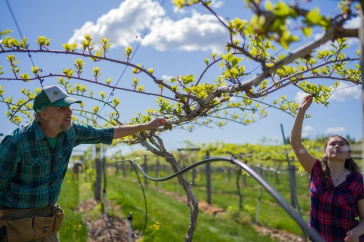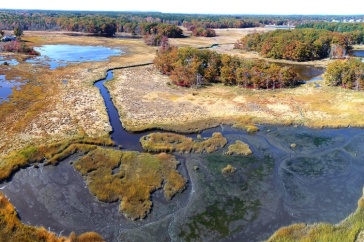
Long-time station scientist Becky Sideman is St. James’ guest May 27.
Did you know you can make syrup from sycamore trees? And that seedless table grapes grown locally taste nothing like what you get at the grocery store? How about that wet brewers grains are a sustainable, cost-effective alternative for heifer feed? And did you know that researchers with the NH Agricultural Experiment Station at the UNH College of Life Sciences are working to solve a million-dollar problem for the state's growing aquaculture industry?
Experiment station researchers will take center stage in May and June as part of the New Hampshire Department of Agriculture, Markets & Food’s spotlight series on Granite State agriculture. The interviews with award-winning broadcaster Peter St. James will air on 99.7 WNTK news talk radio at 9:15 a.m. Thursday, May 13 and 27, and June 10 and 24.?
“The purpose of these spots is to introduce and expand listeners’ knowledge of the diversity of New Hampshire agriculture. We partner with all agricultural organizations in New Hampshire to give everyone the opportunity to tell their story and again to illustrate how broad the agricultural industry is in our state. The experiment station highlights this perfectly with all of the different research projects focused on enhancing agriculture. We love to bring these fascinating projects to the public,” said Gail McWilliam Jellie, director, Division of Agricultural Development, New Hampshire Department of Agriculture, Markets & Food.
"NH Agricultural Experiment Station researchers seek answers to yet unanswered locally inspired questions for ensuring sustainable, vibrant, economically resilient agricultural and food systems in New Hampshire. Our long-standing relationship with the NH Department of Agriculture continues to be critical for the NH Agricultural Experiment Station scientists to directly communicate novel, innovative solutions to our state's communities that will most benefit from that new knowledge," said Anton Bekkerman, director, NH Agricultural Experiment Station.?
On May 13, doctoral student David Moore will discuss his research on unique tasting, high-value syrups. Deciduous hardwoods such as sycamore, beech, birch, hickory, and basswood may offer commercial and backyard maple syrup producers an untapped opportunity to extend the Northeast sugaring season and diversify the industry and your next pancake breakfast with high-value niche syrups.?
Long-time station scientist Becky Sideman is St. James’ guest May 27. She will talk about her seedless table grape research, including which varieties grow well in New Hampshire, and the pros and cons of different growing systems. This is an opportunity for Granite State vineyard managers, backyard enthusiasts, and consumers to learn about the diverse tastes of locally grown seedless table grapes.
Station researcher Pete Erickson will kick off National Dairy Month when he joins St. James June 10, to discuss dairy cattle nutrition as it pertains to dairy calf, heifer, and cow health and metabolism. His most recent research investigates wet brewers grains, the abundant residues of the brewery industry, as a potential cost-effective, high-nutrient feed replacement for dairy heifers and a value-adding beer production byproduct for the state's growing number of craft brewers.?
And on June 24, researchers David Plachetzki and Sydney Birch will discuss their research that aims to solve a million-dollar headache for the aquaculture industry. Globally, more than 50 percent of all human-consumed seafood is produced by aquaculture, yet a pesky little jellyfish-like animal is causing major problems—and major costs—for fish farming by choosing to permanently live on and reduce the functionality of nets and equipment. They have discovered new possible ways to dissuade these animals from calling aquaculture production systems home.?
This material is based upon work supported by the NH Agricultural Experiment Station, through joint funding of the National Institute of Food and Agriculture, U.S. Department of Agriculture, and the state of New Hampshire.
Founded in 1887, the NH Agricultural Experiment Station at the UNH College of Life Sciences and Agriculture is UNH’s first research center and an elemental component of New Hampshire's land-grant university heritage and mission. We steward federal and state funding, including support from the USDA National Institute of Food and Agriculture, to provide unbiased and objective research concerning diverse aspects of sustainable agriculture and foods, aquaculture, forest management, and related wildlife, natural resources, and rural community topics. We maintain the Woodman and Kingman agronomy and horticultural research farms, the Macfarlane Research Greenhouses, the Fairchild Dairy Teaching and Research Center, and the Organic Dairy Research Farm. Additional properties also provide forage, forests, and woodlands in direct support to research, teaching, and outreach.
-
Written By:
Lori Tyler Gula, Ph.D., '19 | NH Agricultural Experiment Station | lori.gula@unh.edu | 603-862-1452



















































